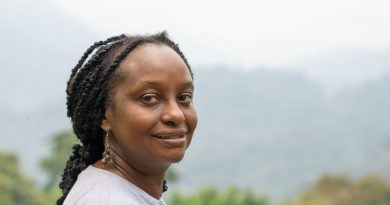A United Front Against Okapi Trafficking
The dust diffused in the afternoon sun as Congolese authorities lugged several containers of illegal cargo into the light. Each box contained the velvety brown, uniquely striped skins and body parts from okapi poached in the Democratic Republic of Congo’s (DRC) Okapi Wildlife Reserve. This seizure, which also resulted in an arrest, is indicative of an unsettling increase in illegal wildlife trafficking between eastern DRC and Uganda. Conserv Congo, a local NGO partnering with authorities, seeks to smother this emerging trend with support from the Okapi Conservation Project (OCP), who have protected the Reserve’s okapi for over 35 years.
Okapi are Endangered relatives of giraffes found only in the remote forests of DRC, so distinctive and rarely seen that they are sometimes called Africa’s unicorns. The Reserve is one of their only strongholds, housing approximately 3,200 okapi as of a 2018 census. But this already fragile population has been declining in recent years due to increased poaching. Okapi in the Reserve, as well as Lomami and Virunga National Parks, are being killed and trafficked to Uganda and faraway markets like Southeast Asia and the Middle East. Their ornate skins are sold as decorations, while okapi meat, bones, and fat are targeted for false medicinal value, with every part selling for thousands of dollars.
With OCP providing financial support and information about illegal sales from neighboring communities, Conserv Congo is leading a thorough response to the trafficking of okapi and other wildlife. Their investigation revealed that 80% of the illegal wildlife products seized in Uganda originate from DRC, and estimates that products from up to 10 okapi have been crossing the border every month since 2019. OCP worries that, if this poaching is not stopped, it may decimate DRC’s small okapi population within just a few years.
Together with DRC and Ugandan authorities, Conserv Congo created a taskforce to pursue these wildlife criminals on both sides of the border. Their large informant network helps identify the sellers and buyers of okapi products. OCP’s close relationship with DRC communities and Reserve ecoguards plays a crucial role in this pursuit, helping Conserv Congo receive tips on poaching activity, develop a map of trade routes, and collect intelligence that facilitates arrests. By exchanging data and launching joint patrols, this taskforce has successfully captured nine traffickers in possession of okapi products and is currently investigating another eight. Two of these criminals have been sentenced, but convictions are sometimes difficult to secure; it is not uncommon for charges to suddenly be dropped. OCP aid allows Conserv Congo to stay involved throughout the lengthy prosecution process to ensure each trafficker is appropriately sentenced.
OCP will continue supporting Conserv Congo to disrupt the international trade of okapi parts between DRC and Uganda. They intend to build upon what has worked so far to expand the area covered, further enlist community assistance, and help authorities bring more poachers and traffickers into custody. With so few okapi left in the wild, OCP and Conserv Congo will work with the DRC government to dampen this growing threat.








